FLOBER, GUSTAV(Flaubert, Gustav) (1821-1880), French writer often referred to as the creator of the modern novel. Born December 12, 1821 in Rouen, where his father was the chief physician of one of the local hospitals. From 1823 to 1840, Flaubert studied at the Royal College of Rouen, where he did not achieve much success, but showed an interest in history and a great love for literature. He read not only the romantics who were fashionable at that time, but also Cervantes and Shakespeare. At school, he met the future poet L. Bouyer (1822-1869), who became his faithful friend for life.
In 1840, Flaubert was sent to Paris to study law. After studying for three years, he failed to pass the exams, but made friends with the writer and journalist M. Du Kan (1822-1894), who became his travel companion. In 1843, Flaubert was diagnosed with a nervous disorder similar to epilepsy, and he was prescribed a sedentary lifestyle. After the death of his father in 1846, he returned to the Croisset estate near Rouen, took care of his mother and was mainly engaged in literature. Fortunately, he possessed a fortune that relieved him of the need to earn a living with a pen or other means. Likewise, he was able to fulfill his travel dream and devote many years to writing a single novel. He perfected his style with utmost attention, being distracted only by professional conversations with the Goncourt brothers, I. Ten, E. Zola, G. Maupassant and I. S. Turgenev. Even his illustrious love story is associated with the poet Louise Cole, and literary problems were the main theme in their extensive correspondence.
Flaubert was brought up on the works of F. Chateaubriand and V. Hugo and gravitated towards a romantic way of depicting. Throughout his life, he strove to suppress the lyric-romantic principle in himself for the sake of the most objective depiction of everyday reality. Starting to write early, he soon realized in himself the conflict between the goal and the inclinations of his nature. The first of his published novels - Madame Bovary (Madame bovary, 1857.
Great creation of literature, Madame Bovary marked a turning point in the development of the modern novel. Flaubert worked on each sentence in search of the famous “right word” (“mot juste.” His interest in the form of the novel, successfully translated into a unique structure Madame Bovary, had a strong influence on subsequent writers, who set as their goal the creation of new forms and techniques - H. James, J. Conrad, J. Joyce, M. Proust and many others.
The main theme Madame Bovary became an eternal conflict between illusion and reality, between invented and genuine life. To reveal this theme, Flaubert used not the heroic impulses of a noble personality, but the pitiful dreams of an ordinary bourgeois woman. Flaubert gave his narrow-minded characters a sublimely universal meaning. Madame Bovary was first published in the magazine "Revue de Paris" in 1856, however, despite the fact that alarmed M. Du Kahn and M. Pisch made serious amendments and reductions, the author and editors of the magazine were brought to trial for insulting public morality. After a sensational trial - one of the most famous literary battles in the legal field - Flaubert was acquitted, and in 1857 the novel was published as a separate book without any cuts.
Flaubert's second novel, Salammbô (Salammbô, 1862), was the result of a trip to Africa in 1858, as well as serious historical and archaeological studies. Obviously, the author's desire to abandon the commonplace, creating an epic canvas on themes of hoary antiquity. The action takes place in Carthage after the 1st Punic War, when the mercenaries led by Mato rebelled against the Carthaginians led by Hamilcar.
In the third novel, Educating the senses (L "education sentimentale, 1859; Russian translation of 1870 titled Sentimental upbringing), Flaubert writes the history of his generation, confused by romanticism and generous promises of theorists of a humane social order, but forced to descend to earth after the catastrophe of 1848 and the collapse of idealism. Educating the senses is a hard-hitting portrait of a lost generation.
Started long before Madame Bovary and, on the advice of Bouillet and Du Caen, put aside The temptation of St. Anthony (La Tentation de Saint-Antoine 1874) owes its origin to the painting by Pieter Bruegel the Elder, which Flaubert saw in Genoa in 1845. Flaubert was occupied with the idea of parading the temptations that besieged the saint for the rest of his life, and its embodiment in the dialogue novel is an attempt to show all conceivable sins, heresies, religion and philosophy.
Three stories (Trois contes, 1877) include plots of two types - deliberately ordinary and flowery-historical. A short and powerful story about the life of a village servant ( Simple heart – Un coeur simple) the whole consists of a chain of losses, which left her at the end of her life only with a stuffed parrot, to which she becomes so attached that she unconsciously begins to treat him as the Holy Spirit. V The Legend of St. Julian the Stranger (La Légende de Saint-Jullien l "Hospitalier) a medieval righteous man who repented of the sins of his youth is subjected to the last highest test: the leper turns to him with a request for a kiss. Having fulfilled his desire, Julian finds himself face to face with Jesus, who took him to heaven. Herodias (Hérodias) tells of Salome, demanding the head of John the Baptist.
Flaubert gave the last eight years of his life to his beloved brainchild - a novel Bouvard and Pécuchet (Bouvard et Pécuchet, 1881; Russian translation 1881), which remained unfinished. In the story of two small employees who decide to devote their leisure and small income to the study of all branches of human knowledge, the main target is the madness and inescapable stupidity of the human race. Flaubert categorizes all such examples with grim delight, forcing his heroes to devote their lives to creating an anthology of the absurdities they discovered.
One of Flaubert's greatest creations, and one that continues to arouse intense interest, is his Letters (Correspondence, publ. 1887-1893). In easy communication with friends, he pours his thoughts on paper, not caring about style and thus providing a unique opportunity to see an artist analyzing his work in the process of daily creation and formulating his ideas about the nature of literature. Along with a striking self-portrait of Flaubert himself, the correspondence contains insightful observations about the people and mores of the era of the Second Empire.
In the last years of his life, Flaubert was haunted by misfortunes: the death of his friend Bouillet in 1869, the occupation of the estate by the advancing enemy army during the Franco-Prussian war, and finally, serious financial difficulties. He did not experience commercial success with the publication of his books, which for a long time aroused rejection from critics. Flaubert died at Croisset on May 8, 1880.
Gustave Flaubert was born on December 12, 1821 into the family of a famous surgeon, spent all his childhood and adolescence at the hospital where his father's apartment was located. From an early age, Flaubert himself thought that a different career was destined for him, although he began to write already in adolescence. An interest in life, but more than death, which largely determined the semantic core of future works, arose here, within the walls of the Rouen hospital, when, as a boy, secretly from his parents, Gustave made his way into the autopsy room and watched the bodies disfigured by death.
After receiving his initial education at the Royal College of Rouen, in 1840 Flaubert went to Paris to study law. This decision was not dictated by the heart: jurisprudence did not interest the young man in the least. In the most romantic capital of the world, he lives more than alone, he has practically no companions.
After studying for three years at the Sorbonne, Flaubert failed to pass the transfer exam. In the same year, he was diagnosed with a disease that resembles epilepsy in symptoms. Doctors strongly advise Gustave to lead a sedentary lifestyle, and constant seizures, the salvation from which he saw only in taking hot baths, plague him. To find salvation from illness, the future writer goes to Italy.
The year 1845 radically changes his life vector: his father dies, and then his beloved sister, Carolina. Flaubert takes care of his sister's daughter and her husband, and also decides to return home to his mother in order to overcome the pain of loss with her. Together with her, they settle on a small, picturesque estate at Croisset, near Rouen. From that moment on, Flaubert's whole life will be associated with this place, which he left for a long time only twice.
The inheritance allowed Flaubert not to know material worries, without having an official service, he worked daily and painstakingly on his works.
In line with the then dominant romanticism in literature, his first stories were written: "Memoirs of a Madman" (1838) and "November" (1842). But in the unseen novel "Education of the Senses", work on which lasted from 1843 to 1845, notes of realism are clearly traced.
The beginning of his relationship with Louise Colet, a rather famous writer at that time, dates back to 1846, whom he met while still in Paris. This love affair, spanning eight years, was the longest lasting affection in Flaubert's life. Due to the fact that the writer was very afraid to pass on his ailment by inheritance, he, not wanting to continue his family, did not propose to anyone, although he was always popular with women.
Glory fell on Flaubert when, in 1856, his first novel, Madame Bovary, which is the writer's trademark, was published in the Revue de Paris magazine. Painstakingly, day after day, for five years, pondering every word he wrote, Flaubert wrote a book about how illusion can destroy reality. The plot is simple: an unremarkable, more than an ordinary bourgeois woman, in order to add color to her life, starts two intrigues, not noticing that a loving person was always there.
The novel, which ended in the heroine's suicide, made a lot of noise. The author and editors of the magazine were sued for immorality. The sensational trial ended with an acquittal. But in 1864, the Vatican added Madame Bovary to the Forbidden Books Index.
The finest psychology in revealing the image of the main character became a real discovery in literature and largely determined the path of development of the entire European novel.
In 1858, Flaubert made a trip to Africa, bringing from the voyage not only impressions, but also his second novel "Salammbô", the action of which takes the reader to ancient Carthage, making him a witness of the love of the daughter of a military leader and the leader of the barbarians. Historical accuracy and respect for every detail of the narrative allowed this book to take its rightful place in a number of historical novels.
The third novel of the writer "Education of the Senses" is devoted to the theme of the "lost generation".
Gustave Flaubert Born December 12, 1821 in Rouen - died May 8, 1880 in Croisset. French realist prose writer considered one of the greatest European writers of the 19th century. He worked a lot on the style of his works, putting forward the theory of the "exact word" (le mot juste). Best known as the author of the novel Madame Bovary (1856).
Gustave Flaubert was born on December 12, 1821 in the city of Rouen into a petty bourgeois family. His father was a surgeon at the Rouen hospital, and his mother was the daughter of a doctor. He was the youngest child in the family. In addition to Gustave, the family had two children: an older sister and a brother. The other two children did not survive. The writer spent his childhood joylessly in the doctor's dark apartment.
The writer studied at King's College and Lyceum in Rouen, starting in 1832. There he met Ernest Chevalier, with whom he founded Art and Progress in 1834. In this edition, he first published his first public text.
In 1836 he met Eliza Schlesinger, who had a profound influence on the writer. He carried his silent passion throughout his life and reflected it in the novel "Education of the Senses".
The writer's youth is associated with the provincial cities of France, which he has repeatedly described in his work. In 1840, Flaubert entered the Faculty of Law in Paris. There he led a bohemian life, met many famous people, wrote a lot. He dropped out of school in 1843 after the first epileptic stroke. In 1844, the writer settled on the banks of the Seine, not far from Rouen. Flaubert's lifestyle was characterized by isolation, a desire for self-isolation. He tried to devote time and energy to literary creation.

In 1846, his father died, and after a while his sister. His father left him a solid legacy on which he could live comfortably.
Flaubert returned to Paris in 1848 to take part in the Revolution. From 1848 to 1852 he traveled to the East. He visited Egypt and Jerusalem, via Constantinople and Italy. He wrote down his impressions and used them in his works.
Since 1855 in Paris, Flaubert has visited many writers, including the Goncourt brothers, Baudelaire, and also meets with.
In July 1869 he was deeply shaken by the death of his friend Louis Boulet. There is evidence that Flaubert had an affair with his mother, which is why they had friendly relations.
During the occupation of France by Prussia, Flaubert hid in Rouen with his mother and niece. His mother died in 1872, at which time the writer was already having money problems. Health problems also begin. He sells his property, leaves an apartment in Paris. He publishes his works one by one.
The last years of the writer's life were marred by financial problems, health problems and betrayal of friends.
Gustave Flaubert died on May 8, 1880 as a result of a stroke. The funeral was attended by many writers, including Alphonse Daudet, Edmond Goncourt and others.
Flaubert's writings:
"Memoirs of a Madman" / fr. Mémoires d "un fou, 1838
"November" / fr. Novembre, 1842
"Education of the Senses", 1843-1845
“Madame Bovary. Provincial customs "/ fr. Madame Bovary, 1857
"Salammbo" / fr. Salammbô, 1862
"Education of the senses" / fr. L "Education sentimentale, 1869
"The Temptation of St. Anthony" / fr. La Tentation de saint Antoine, 1874
"Three stories" / fr. Trois contes, 1877
Bouvard and Pécuchet, 1881
Adaptations of Flaubert:
Madame Bovary, (directed by Jean Renoir), France, 1933
Madame Bovary (directed by Vincente Minnelli), 1949
Education of the Senses (directed by Marcel Cravenne), France, 1973
Save and Save (directed by A. Sokurov), USSR, 1989
Madame Bovary, (directed by Claude Chabrol), France, 1991
Mrs. Maya (Maya Memsaab), (directed by Ketan Mehta), 1992, (based on the novel "Madame Bovary")
Madame Bovary (directed by Tim Fivell), 2000
Night after Night / All Nights (Toutes les nuits), (directed by Eugene Green), (based on), 2001
Simple Soul (Un coeur simple) (directed by Marion Lane), 2008
Madame Bovary (directed by Sophie Barthez), 2014
fr. Gustave flaubert
French realist prose writer considered one of the greatest European writers of the 19th century
short biography
The famous French novelist, one of the founders of the modern novel genre, was a native of the city of Rouen, where he was born on December 12, 1821. His father was a famous doctor, his mother was a representative of an old Norman family. During the years 1823-1840. Gustave was a student of the city's Royal College. He did not shine with success in studies, but already in those years his great love for literature and passion for history manifested itself.
In 1840 Flaubert became a law student at the Paris Sorbonne. In 1743, he was diagnosed with a disease of the nervous system, reminiscent of epilepsy and requiring a decrease in motor activity. The illness forced him to stop studying at the university in 1844. When his father died in 1846, Gustave moved to the Croisset estate near Rouen to live with his mother, and his entire further biography was associated with this place. Flaubert led a secluded life and left here for a relatively long time only twice in his life, and in both cases his companion was Maxim Dukan, his best friend.
The inheritance inherited from their father allowed them and their mother not to think about their daily bread, Flaubert could completely surrender himself to literary work. His first novellas - Memoirs of a Madman (1838), November (1842) - were written in the spirit of French romanticism, but already in the first edition of the novel "Education of the Senses" (1843-1845, remained unpublished), a transition to realistic positions was noticeable.
In 1848-1851, the period after the defeat of the revolution, Flaubert, for ideological reasons, did not participate in public life, the Paris Commune was not understood and accepted by him. He lived in a completely different world, adhering to the concept of isolation and elitism of literature.
In 1856, a work was published that became a masterpiece of world literature and a new stage in the development of the modern novel - “Madame Bovary. Provincial customs ". The novel appeared on the pages of the magazine "Revue de Paris" with editorial notes, however, even this did not save the book from being accused of immorality and bringing its author to justice. After an acquittal, the novel was released in full in 1857 as a separate edition.
In 1858, Flaubert undertook a trip to Tunisia and Algeria, where he collected factual material for the second novel, Salammbô (published in 1862). In 1863, the third novel, "Education of the Senses," was published; in 1874, The Temptation of St. Anthony, a dramatic poem in prose of philosophical content, was published. The culmination of Flaubert's creative biography was the Three Tales published in 1877 and the unfinished novel Bouvard and Pécuchet.
The last ten years of Flaubert was unhappy: his illness deprived him of his strength and optimism, the estate was occupied during the Franco-Prussian war by a foreign army, his mother and good friend Bouillet died, his friendship with Maxime Dukan was broken. Finally, he experienced financial difficulties, since most of the fortune was donated to less well-to-do relatives, and the publication of books did not bring a lot of money: critics did not favor his works. However, Flaubert was not completely alone, he was friends with George Sand, was the mentor of Guy de Maupassant, and his niece took care of him. The writer's body was severely emaciated, and he died on May 8, 1880 from a stroke.
Flaubert's work had a significant impact not only on national, but also on world literature. In addition, thanks to his mentorship, a number of gifted writers came to literature.
Biography from Wikipedia
Gustave Flaubert(fr. Gustave Flaubert; December 12, 1821, Rouen - May 8, 1880, Croisset) - French realist prose writer, considered one of the largest European writers of the XIX century. He worked a lot on the style of his works, putting forward the theory of the "exact word" ( le mot juste). Best known as the author of the novel Madame Bovary (1856).
Gustave Flaubert was born on December 12, 1821 in the city of Rouen into a petty bourgeois family. His father was a surgeon at the Rouen hospital, and his mother was the daughter of a doctor. He was the youngest child in the family. In addition to Gustave, the family had two children: an older sister and a brother. The other two children did not survive. The writer spent his childhood joylessly in the doctor's dark apartment.
From 1832 he studied at the Royal College and Lyceum in Rouen, where with a friend (Ernest Chevalier) he organized the handwritten magazine "Art and Progress" in 1834. His first public text appeared in this magazine.
In 1836 he met Eliza Schlesinger, who had a profound influence on the writer. He carried his silent, unrequited passion throughout his life and reflected it in the novel "Education of the Senses".
The writer's youth is associated with the provincial cities of France, which he has repeatedly described in his work. In 1840, Flaubert entered the Faculty of Law in Paris. There he led a bohemian life, met many famous people, wrote a lot. He dropped out of school in 1843 after his first epileptic seizure. In 1844, the writer settled on the banks of the Seine, not far from Rouen. Flaubert's lifestyle was characterized by isolation, a desire for self-isolation. He tried to devote time and energy to literary creation.
In 1846, his father died, and after a while his sister. His father left him a solid legacy on which he could live comfortably.
Flaubert returned to Paris in 1848 to take part in the Revolution. From 1848 to 1852 he traveled to the East. He visited Egypt and Jerusalem, via Constantinople and Italy. He wrote down his impressions and used them in his works.
Since 1855, in Paris, Flaubert has visited many writers, including the Goncourt brothers, Baudelaire, and also met Turgenev.
In July 1869 he was deeply shaken by the death of his friend Louis Bouillet. There is evidence that Flaubert had love affairs with the mother of Guy de Maupassant, which is why they had friendly relations.
During the occupation of France by Prussia, Flaubert hid in Rouen with his mother and niece. His mother died in 1872, at which time the writer was already having money problems. Health problems also begin. He sells his property, leaves an apartment in Paris. He publishes his works one by one.
The last years of the writer's life were marred by financial problems, health problems and betrayal of friends.
Gustave Flaubert died on May 8, 1880 as a result of a stroke. The funeral was attended by many writers, including Emile Zola, Alphonse Daudet, Edmond Goncourt, and others.
Creation
In 1849 he completed the first edition of The Temptation of St. Anthony, a philosophical drama, on which he subsequently worked all his life. In terms of worldview, it is imbued with ideas of disillusionment with the possibilities of cognition, which is illustrated by the clash of different religious trends and corresponding doctrines.
 First edition of Madame Bovary 1857. Title
First edition of Madame Bovary 1857. Title
Flaubert became famous for the publication in the magazine of the novel Madame Bovary (1856), on which work began in the fall of 1851. The writer tried to make his novel realistic and psychological. Shortly thereafter, Flaubert and the editor of the Revue de Paris were prosecuted for "defaming morality." The novel turned out to be one of the most important forerunners of literary naturalism, but it clearly expresses the author's skepticism in relation not only to modern society, but also to man in general. As B.A.Kuzmin noted,
in the work itself, Flaubert seems to be ashamed to show his sympathy for people who are not worthy of this sympathy, and at the same time considers it beneath his dignity to show his hatred for them. Flaubert's posture of dispassion arises as a resultant of this potential love and quite real hatred of people.
Some of the formal features of the novel noted by literary critics are a very long exposition, the absence of a traditional positive hero. The transfer of the action to the province (with its sharply negative image) places Flaubert among the writers in whose work the anti-provincial theme was one of the main ones.
 Gaston Bussiere... Salammbô. 1907
Gaston Bussiere... Salammbô. 1907
The acquittal allowed the novel to be published in a separate edition (1857). The preparatory period of work on the novel "Salammbo" required a trip to the East and North Africa. This is how the novel appeared in 1862. This is a historical novel that tells the story of the uprising in Carthage in the third century BC. NS.

Two years later, in September 1864, Flaubert completed work on the final version of The Education of the Senses. The third novel "Education of the Senses" (1869) was full of social problems. In particular, the novel describes the European events of 1848. The novel also includes the author's own events, such as the first love. The novel was greeted coldly, and only a few hundred copies were printed.
In 1877 he published in magazines the stories "Simple Heart", "Herodias" and "The Legend of Saint Julian the Merciful", written in between work on the last novel "Bouvard and Pécuchet", which remained unfinished, although we can judge about its finale by the surviving author's sketches, sufficiently detailed.
From 1877 to 1880 he edited the novel Bouvard and Pécuchet. This is a satirical work that was published after the death of the writer in 1881.
A brilliant stylist who carefully honed the style of his works, Flaubert had a tremendous influence on all subsequent literature, brought in a number of talented authors, including Guy de Maupassant and Edmond Abou.
Flaubert's works were well known in Russia, and Russian critics wrote about them sympathetically. His works were translated by I.S.Turgenev, who had close friendship with Flaubert; MP Mussorgsky created an opera based on "Salammbo".
Major works
Gustave Flaubert, a contemporary of Charles Baudelaire, played a leading role in 19th century literature. He was accused of immorality and admired, but today he is recognized as one of the leading writers. The novels "Madame Bovary" and "Education of the Senses" brought him fame. His style combines elements of both psychologism and naturalism. Flaubert himself considered himself a realist.
Gustave Flaubert began work on Madame Bovary in 1851 and worked for five years. The novel was published in the magazine Revue de Paris. The style of the novel is similar to the works of Balzac. The plot tells the story of a young man named Charles Bovary, who recently completed his studies at a provincial lyceum and received a position as a doctor in a small settlement. He marries a young girl, the daughter of a wealthy farmer. But the girl dreams of a beautiful life, she reproaches her husband for his inability to provide such a life and gets herself a lover.
The novel "Salammbô" was published after the novel "Madame Bovary". Flaubert began work on it in 1857. He spent three months in Tunisia studying historical sources. When it appeared in 1862, it was received with great enthusiasm. The novel begins with the mercenaries celebrating their victory in the war in the gardens of their general. Angry at the general's absence and remembering their grievances, they smash his property. Salammbô, the general's daughter, comes to calm down the soldiers. Two mercenary leaders fall in love with this girl. The freed slave advises one of them to conquer Carthage in order to get the girl.
Work on Education for the Senses began in September 1864 and ended in 1869. The work is autobiographical. The novel tells about a young provincial who goes to study in Paris. There he learns friendship, art, politics and cannot make a choice between monarchy, republic and empire. Many women appear in his life, but they are not comparable to Marie Arnoux, the merchant's wife, who was his first love.
The idea of the novel "Bouvard and Pécuchet" appeared in 1872. The author wanted to write about the vanity of his contemporaries. Later he tried to understand the very nature of man. The novel tells how, on a hot summer day, two men, Bouvard and Pécuchet, meet and get to know each other by chance. Later it turns out that they have the same profession (copying) and even common interests. If they could, they would live outside the city. But, having received an inheritance, they still buy a farm and are engaged in agriculture. Later, their inability for this work is revealed. They try their hand at medicine, chemistry, geology, politics, but with the same result. Thus, they return to their profession of copying.
Essays
- "Memoirs of a Madman" / fr. Mémoires d "un fou, 1838
- "November" / fr. Novembre, 1842
- “Madame Bovary. Provincial customs "/ fr. Madame Bovary, 1857
- "Salammbo" / fr. Salammbô, 1862
- "Education of the senses" / fr. L "Education sentimentale, 1869
- "The Temptation of St. Anthony" / fr. La Tentation de saint Antoine, 1874
- "Three stories" / fr. Trois contes, 1877
- Bouvard and Pécuchet, 1881
Screen adaptations
- Madame Bovary, (directed by Jean Renoir), France, 1933
- Madame Bovary (directed by Vincente Minnelli), 1949
- Education of the Senses (directed by Marcel Cravenne), France, 1973
- Save and Save (director Alexander Sokurov), USSR, 1989
- Madame Bovary, (directed by Claude Chabrol), France, 1991
- Mrs. Maya (Maya Memsaab), (directed by Ketan Mehta), 1992, (based on the novel "Madame Bovary")
- Madame Bovary (directed by Tim Fivell), 2000
- Night after Night / All Nights (Toutes les nuits), (directed by Eugene Green), (based on), 2001
- Simple Soul (Un coeur simple) (directed by Marion Lane), 2008
- Madame Bovary (directed by Sophie Barthez), 2014
Music
- opera "Madame Bovary" / Madame Bovary (1955, Naples), composer Guido Pannain.
Years of life: from 12.12.1821 to 08.05.1880
Famous French novelist, head of the realistic school in France.
Flaubert was born in Rouen, in the North Normandy region of France. He was the second son of the Flaubert family, his father a renowned surgeon, and the mother of Anne Justine Caroline Flaubert. He began to write at an early age, before the age of eight, as is known from some sources.
Flaubert studied in his hometown at the Royal College of Rouen (1823-1840) and did not leave it until 1840, when he left to study law in Paris. After studying for three years, he failed to pass the exams, but made friends with the writer and journalist M. Du Kan, who became his travel companion. By the end of 1840, Flaubert was traveling in the Pyrenees and Corsica.
In 1843, Flaubert was diagnosed with a nervous disorder similar to epilepsy, and he was prescribed a sedentary lifestyle. Illness led to the fact that Flaubert did not complete the course, but went on a journey. In 1845 he traveled to Italy. Flaubert traveled with his friend in Brittany in 1846.
After the death of his father in 1846, he returned to the Croisset estate near Rouen, took care of his mother and was mainly engaged in literature. Flaubert until the end of his days lived in his father's house on the banks of the Seine.
In September 1849, Flaubert completed the first version of The Temptation of St. Anthony. In the same year, he traveled to Egypt, Syria, Palestine, Greece.
In 1850, after his return, the writer began work on the novel Madame Bovary. The novel, which took five years to write, was published in the Ruve de Paris (Paris Magazine) in 1856. The government initiated proceedings against the publisher and the author on charges of immorality, but both were acquitted. The novel Madame Bovary, which appeared in book form, was received very warmly.
Beginning in 1850, Flaubert lived at Croisset, making occasional visits to Paris and England, where he had mistresses. He visited Carthage in 1858 looking for prototypes and examples for his novel Salammbô. The novel was completed in 1862, after a year of work.
Based on the events of his childhood, Flaubert's next work, "Education of the Senses," took seven years of hard work. Education of the Senses, the last completed novel, was published in 1869.
Fulfilling his civic duty, during the Franco-Prussian War of 1870-1871, Flaubert served in the army with the rank of lieutenant and was awarded the Order of the Legion of Honor. The year 1870 was difficult. Parisian soldiers occupied Flaubert's home during the War in 1870, and his mother died in 1872. After the death of his mother, the writer faced financial difficulties.
Flaubert wrote a rather unfortunate drama, The Candidate, and also published a revised version of The Temptation of St. Anthony, part of which was published in 1857. He devoted most of his time to a new project, Two Woodlice, which later became known as Bouvard et Pécuchet, and broke away from it only to write Three Tales in 1877. This book included three stories: "A Simple Soul", "The Legend of St. Julian the Stranger" and "Herodias". After the publication of these stories, he devoted the rest of his life to the unfinished work Bouvard et Pécuchet, which was published posthumously in 1881.
Flaubert suffered from sexually transmitted diseases for most of his life. His health deteriorated and he died at Croisset of a stroke in 1880 at the age of 58. Flaubert was buried in the family plot, in the cemetery in Rouen.
Flaubert read The Temptation of St. Anthony aloud to his friends for four days, not allowing them to stop and express any opinion. At the end of the reading, they told him to throw the manuscript into the fire, suggesting that he focus on everyday life rather than fantastic objects.
Flaubert loved to write letters that are collected in various publications.
Flaubert was a tireless worker and often, in letters to friends, complained about the busy schedule. He was close to his niece, Caroline Commonville, was friends and corresponded with Jerzy Sand. Occasionally he visited his Parisian acquaintances, including Emile Zola, Ivan Turgenev, Edmond and Julia Goncot.
The writer has never been married. From 1846 to 1854, he had a relationship with the poet Louise Colette, which can be called his only serious relationship. Gradually losing interest in each other, Gustave and Louise parted.

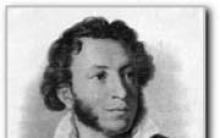
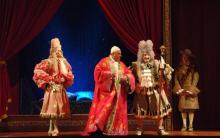
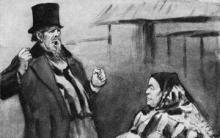
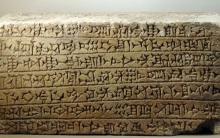
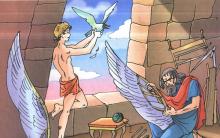
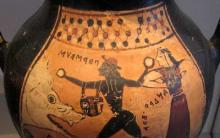




Yulia efremenkova - biography, information, personal life What is the past of Julia from home 2
Yulia Efremenkova: photo on Instagram House 2 Yulia's past
Strange death of the director of "Ural dumplings" Death of one of the Ural dumplings
Creating modular paintings: a master class for beginners How to make a modular painting from wallpaper
April 1 jokes in action